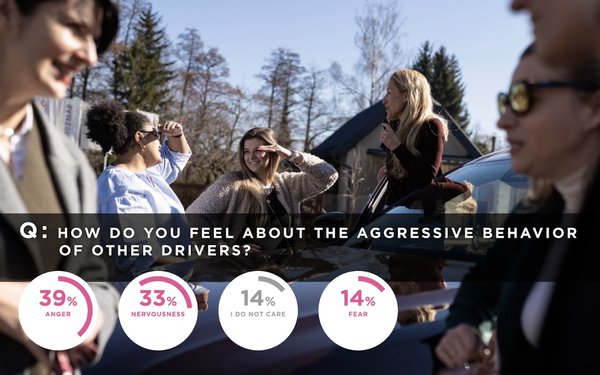Commentary
Women Drivers Report Encountering Road Rage
- by Tanya Gazdik , Staff Writer, June 30, 2025

A huge majority (95%) of women drivers say they have experienced aggressive behavior from other drivers while behind the wheel.
That’s according to a global survey conducted by the Women’s Worldwide Car of the Year in collaboration with the Czech magazine Zenavaute.cz. The study analyzes the perceptions of female drivers from 47 countries.
The research data was released to coincide with International Women Drivers' Day on June 24.
Half of the respondents say that they encounter aggressive behavior on the road very often (51%), almost a third rather often (31%) and more than a tenth of respondents sometimes (13%).
Example of aggressive behavior by others on the road that women drivers considered included driving close to the back of another vehicle (15%), racing (15%) and physically attacking another road user (15%), followed by indecent gestures or verbal insults (13%), braking (12%) and using the horn or flashing high beams when it is not required for traffic safety (11%).
advertisement
advertisement
The survey also focused on how women drivers feel when they encounter aggressive driving.
For more than a third, such situations cause anger (39%). A third of women drivers feel nervous in such moments (34%). Aggressive driving triggers fear in 14% of women drivers, while 14% remain calm and do not care when they encounter aggressive behavior from other drivers on the road.
The survey canvassed 1,879 women drivers worldwide in an online questionnaire that shows women drivers value a sense of cautious driving (29%) and following the rules of the road (25%).
They also are aware of their driving weaknesses, include uncertain/indecisive driving (26%), parking (26%) and driving in difficult conditions (23%). About 7% see slow driving as their weakness.
The goal was to analyze what women drivers feel, what they fear and how they behave on the road, says Sabina Kvasova, editor in chief of the magazine that conducted the survey.
The survey also asked women what they perceive are the prevailing stereotypes in society regarding women drivers.
The dominant objection is that they don't know how to park (46%). Almost half of the 1,879 women drivers in the survey agree with this. Other stereotypes about women drivers include that they drive slowly (21%), they sit too close to the steering wheel (14%), they don't follow traffic rules (8%) and endanger those around them (5%).
International Women Drivers' Day also commemorates the day in 2018 that the ban on women driving in Saudi Arabia was lifted. On that day, women gained mobility and personal freedom, became more visible, and made society aware of the potential of more than 50% of the population formerly not allowed to drive.
Women's Worldwide Car of the Year is the only vehicle award in the world chosen exclusively by women motoring journalists. It was created by New Zealand motoring journalist Sandy Myhre in 2009. She is honorary president, while Marta García is executive president.
The award aims to recognize the best cars of the year and to give a voice to women in the automotive world. The voting criteria are based on the same principles that guide any driver when choosing a car. The jurors do not select a “woman’s car” because cars are not gender-specific. Aspects such as safety, quality, price, design, ease of driving, benefits and environmental footprint are considered.
However, beyond choosing the best cars of the year, the organization also aims to give visibility to women in the automotive world and to contribute to making women’s voices heard on all continents -- because mobility for a woman means access to many personal and professional possibilities.



